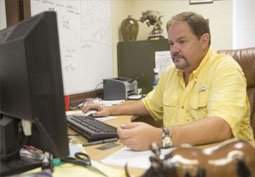By: Amy Clarke Burns (The Greenville S.C. News)
GREENVILLE, S.C. — After they’ve become Army strong or aimed high or been among the few and the proud, veterans leaving military service often join the ranks of another band of distinguished Americans: entrepreneurs.
Veterans are 45% more likely to be self-employed than people with no military service, according to the Small Business Administration’s Task Force on Veterans Small Business Development.
“Being an all-volunteer service, it takes a lot for a veteran — man or woman — to go sign up, get on the bus, go to training and in most cases go through a war. They become fiercely independent,” said Robert Rehder, director of the Veterans Business Outreach Center at Fayetteville State University in Fayetteville, N.C.
The center, an arm of the Small Business Administration, serves eight Southeastern states, providing training, resources and counseling to veterans, their spouses and survivors who are seeking to start or sustain a small business.
“We know that small business has to contribute in a very substantial way to an economic recovery,” Rehder said. “We want veterans to do it because they have some of the characteristics that we’re looking for in small business entrepreneurs.”
Whether they’ve served two years or 25, veterans have undergone extensive training and experiences that distinguish them from everyday civilians and prepare them for the minefield of business ownership.
“Being part of a bigger thing to the point of some level of self-sacrifice — that’s what the military is and that’s what entrepreneurialism is,” said Kamran Popkin, owner of Swag Club, a Greenville, S.C., advertising and promotional products agency, and a veteran of the Navy’s intelligence service.
“I use it every day,” he said.
Barracks to board room
Census data from 2007 shows that at least 2.4 million U.S. businesses are veteran-owned, and industry organization National Veteran-Owned Business Association believes that number may be as high as 5.5 million.
“Some of the things that you learn when you’re in the military foster the idea for entrepreneurial spirit,” said Matthew Pavelek, director of communications for NaVOBA. “If you’re good at being in the military, then a lot of the stuff that makes it challenging for business owners is something you’re already accustomed to.”
Veteran entrepreneurs said those skills include intangibles such as dedication, commitment and leadership.
Popkin, who was a platoon leader of about 80 as a man in his early 20s, said learning to lead at a young age was a boon to his future success as an entrepreneur.
“As a teenage boy with a room full of teenage boys, there were some leadership roles to fill internally. How to manage and motivate other people with other agendas was critical,” he said.
He instituted silly morale projects like “prank week” to keep up esprit de corps, a lighthearted approach he maintains at Swag Club, where chicken wing or cheese parties aren’t an uncommon occurrence.
Mission-oriented training also comes to bear on veterans’ lives as business leaders, they said.
“The service person, even if they’re not an officer, just by their training, they’re naturally logisticians. They’re naturally planners,” Rehder said.
Anyone can follow a dream to come up with a business idea. “The strategy is what makes the idea work,” he said.
“The veteran is used to thinking strategically. They don’t do anything without a plan. They don’t do anything without logistics in place. They don’t do anything without knowing the territory and looking at the repercussions.”
Jeff Bannister, owner of Serve-One process-serving firm and an Army medic during Operation Desert Storm, said being focused on the mission’s goal also encourages veterans to think creatively, a vital skill for entrepreneurs.
“When it comes time to get the mission done — whether it be get that patient on a helicopter, dress that wound, take that hill — we can be way outside the box,” he said.
Breaking from uniformity
The demands and regimentation of the military equip servicemen and women with skills they can carry to the workplace but also may constrict the individualism often embraced in the civilian world.
“Service life is you get up in the morning, and you have a plan of the day that is already written out for you. You know where to go, what to do and what uniform to wear. That is not an entrepreneurial think tank,” Rehder said.
On the other hand, Popkin said, the guidelines establish a standard but don’t necessarily undermine the potential creativity of active and engaged military members.
“Uniform Code of Military Justice, standing orders — those things aren’t necessarily meant to make you an automaton. It’s to give you a framework of behavior,” he said.
“Guys who are successful in the military have probably embraced something like self-discipline, self-control, understanding that as being part of a chain of command, you’re not just taking orders, you’re understanding a commander’s intent statement. That’s powerful stuff.”
Bannister said the rules are procedures that also can be used to make a business run more efficiently.
Ray Kroc, the man who built McDonald’s into a success, was renowned for setting up systems in his business, ensuring that even the weakest member of any team could follow the procedures and succeed, he said.
That kind of process is common in the military, Bannister said, where systems are in place for tasks from large to small.
Rehder said characteristics that distinguish veterans in the marketplace also may be things that help them succeed.
“They are on time and on task,” he said.



